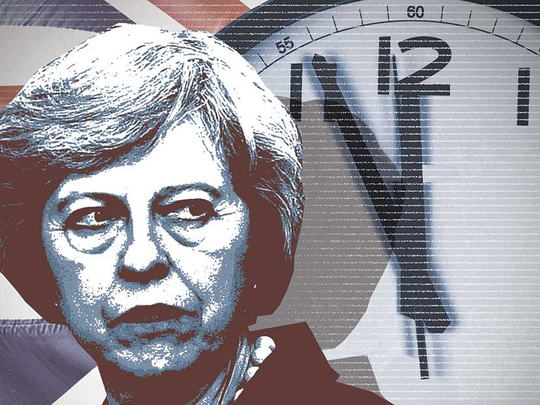
Right now, in London, there’s a WhatsApp group buzzing away on just when to dispose of United Kingdom Prime Minister Theresa May. And when I say ‘when’, I mean just that. The how has already been long settled. All it takes are 48 Members of Parliament belonging to her Conservative Party to sign a letter to the chairman of the 1922 committee of backbench MPs to trigger a confidence vote in her leadership.
Before last Monday’s announcement that the UK and European Union negotiators had reached a deal on a transition period, there were reportedly 45 MPs itching to put pen to paper. Fact is, given that she alone decided to call a general election in June of last year and it resulted in the Conservative majority achieved under David Cameron a year before being erased, she has always been in hot water.
Now, when the fine details of the transition agreement are parsed and purveyed, there will be little difficulty in finding another three to trigger the leadership review. That hot is now positively scalding. And the hardline Brexiteers in her party, led by Foreign Secretary Boris Johnson, Environment Secretary Michael Gove, Trade Secretary Liam Fox and Latin linguist Jacob Rees-Mogg, will be most active on that WhatsApp group chat.
Let’s take Johnson. He famously said that the European Union could “go and whistle” when it came to the United Kingdom having to pay its fair share back to Brussels for leaving the EU club. Well, that transition deal signed last Monday commits Her Majesty’s treasury to cough up a total of £40 billion (Dh206.9 billion) to the boys in Brussels, and the payments will stretch out until 2068. If stretching the payments out for the next five decades is considered to be a victory, it will be a long-term reminder to everyone who loses their job or was opposed to Brexit of just how painful the whole process will be. And for the Brexiteers, £40 billion paid out is a very far cry from the £350 million promised each week paid in to reinvigorate the UK’s crumbling National Health Service. It’s enough to make the Brexiteer MPs sick to their stomachs.
Britain too surrendered its much ballyhooed territorial fishing waters again to the EU. So much for the claim that Brexit would allow British fishermen the right to fish exclusively in their waters.
What the transition deal does do is give the businesses in the UK that relay on the firms and factories of Europe for goods, services and a marketplace, more time to prepare for life outside the open market. So much that for the hardline Brexiteers’ beliefs that magically, on March 30, 2019, all will be right with the world, and Great Britain will suddenly be great again. Hardly. All of those rules and regulations — the red tape that so tightly binds Britain-in-the-EU to the EU, will remain in place.
And here’s one for the hardline Brexiteers. So much for voting to leave and taking back control of Britain’s affairs. Not on your life. The transition deal’s terms mean the European Court of Justice remains as the legal arbiter and power until the end of the transition deal. The English law lords will remain subservient to the ones sitting in Strasburg.
Plumbing problems
When most Britons who voted for Brexit explained their reasons, a lot came down to immigration. Brits were fed up of foreign faces and voices on their high streets, taking their minimum wage jobs, serving them hamburgers or pints, washing their cars, or fixing their plumbing problems. They wanted the foreigners gone — and the sooner the better.
Prime Minister May allowed her Minister for Exiting the EU to agree to letting in as many workers from the EU from now until the end of 2020 — and there’s nothing the current Her Majesty’s Government can do about it.
When the implications of that become fully known in cities like Lincoln, Sunderland or Stoke-on-Trent that voted ‘Leave’ overwhelmingly because of the influx of immigrants from eastern Europe, there’ll be hell to pay.
A series of UK local government elections are set to be held on May 3. One of the when’s being discussed in that WhatsApp group is whether to pull the trigger on May before or after those elections. Do it before, the reasoning goes, and there’s a chance the Conservatives might get a bounce from her departure. Do it after, as soon as parliament goes on summer recess, and it gives a new leader several months before he has to face parliament again, which by then will be howling for a confidence vote.
And that transition deal? Because of the concession made to give Northern Ireland a special status and effectively remain in a customs union with the rest of the EU to ensure an open border, the Democratic Unionists on which May relies now to govern, will be hard-pressed to support her. Their confidence in her is shattered, fractured and in smithereens once and for all.
More than ever, May’s days are numbered.










